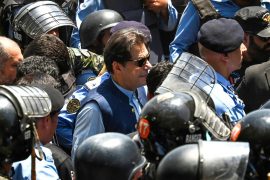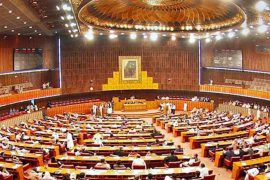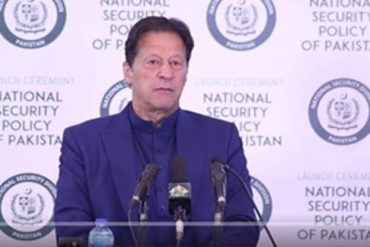The acts of snatching the ballot boxes and ransacking the Vice Chancellor’s residence got us all charged under Martial Law Regulations. It was pretty scary and a new experience for me. Regular laws didn’t apply there. From seeking Union positions we were transformed into “Hawalatis” locked up as common criminals. After a few days in police lock up, ITJ accused were carted off to Camp Jail and NSO/NSF accused were taken to KotLakhpat. My memory is a bit faded so I write to the best of my recollections. Camp Jail was initially fun. Concerned parents, friends, supporters brought us great food. We would laugh,,joke at someones’ expense,play ludo, and cards. Little by little the gravity of our situation dawned on us. Friendly lawyers made us understand the consequences of the deep hole we were in.
We were to be tried in a Martial Law court. I was concerned and felt guilty for putting my family, especially my parents through this turmoil. However, I had a pleasant surprise. My Dad, who always expected me to be a part of the civil service (without ever saying it), was actually supportive. My eldest sister Dr Zia Qayyum was married to Maj Qayyum who subsequently rose to the rank of Major General. Baji Zia, 10 years my senior was like a second Mom. Being the only brother, she had spoiled, supported and loved me. Quyyum Bhai was just as kind and affectionate. He was posted in Lahore with the Brigade doing Martial duty.I felt I would get a fair trial because I had not participated in the ITJ shenanigans at the VC’s Residence and was a victim of ballot box snatching.That hope quickly evaporated once the trial commenced. Martial courts were situated in People’s House, I believe a parliamentary building in normal times.Yet, these were not normal times.

Yahya Khan’s Martial Law was not too repressive or intrusive in the then West Pakistan as it was preoccupied with the secessionist tendencies in East Pakistan, organizing national elections, and preparing for the breakup of one unit into four provincial governments along with the President’s merry ways. ButThose who went through Zia Ul Haq’s brutal Martial Law, especially those belonging to PPP, would empathize with our plight.
Our Martial Law trial was presided over by a serving Colonel who hailed from KP. He laid down the rules very quickly. We would not be represented by any lawyers.There was a prosecution Officer who would record the evidence and lead their witnesses. We as accused were given the opportunity to cross examine these witnesses. The Colonel was a no nonsense boss who was both assertive and intimidating. We were subdued but in our reckless youthful exuberance we had our lighter moments!
The chief prosecution witness was Vice Chancellor AllamaAllaudin Siddiqui. After all, we were charged with ransacking his house. I saw Allama sb’s extreme discomfort. He was a kind, soft spoken academic. He treated students as his children and here he was giving sworn testimony under oath against them. Allama sb would speak softly by nature and because he knew he was sending these kids to jail. The Colonel by the 2nd day burst out “AllamaSb Aap Galey ka motor theek Karo” please get your throat machine fixed! We could not suppress our giggles much to the chagrin of the Coloneland cause further discomfort to Allama sb.
Nonetheless, the biggest tragic drama came when one of the co-accused self incriminated himself. I remember him as Jabbar, probably from Oriental College, who at all times insisted on wearing a Chitrali cap. The factum of ransacking was established. The trial was to determinethose who had participated and/or those who were a part of the planning. The known leaders present at the incident were already on the chopping block. The culpability of other accused was being determined. While cross examining Allama sb, Jabbar burst out: “Allama sb, when we attacked your house was I wearing a cap or not?” Before Allama sb could respond the Colonel butted in “Allama sb may or may not remember but I know you were there!” so this little known, non descript Jabbar, who could have gotten away, ended up being jailed for 6 or 9 months!
My defense was simple, or that is what I thought! I was not at the VC house and did not know anything about the plan. The first part was confirmed by Allama sb, but the Colonel was skeptical about me not knowing about the plan. He questioned me “you were the General Secretary, most important after the President, how could you have not known? ” My position waspretty untenable in the eyes of a person who had served all his life in a chain of command. I argued to best of my ability, about not being part of IJT, but felt I was not able to remove the sneer on the Colonel’s face. Judgment day came. We were all wetting our pants, figuratively speaking. Fortunately,I was let off after more than a month in jail. Hafiz Idrees, Tanveer Tabish and few others received sentences upto 1 year. Jahangir Badr, Imtiaz Alam and others were convicted in a separate Martial Law trial for ballot box theft. They were all shipped off to various jails.
I was back to the University. Student politics had gone awfully quiet. Resilience is a gift of youth. Students went about their business as if nothing had happened. Balance of the academic year was pretty
uneventful. Those with a political itch were participating in National politics. I believe I am born with an entrepreneurial streak, which my family and friends disrespectfully call “pangaybazi” ; I tried
to set up a business with my trusted friend Yusuf (Honda) Khan in Islamabad, as small time vendors in Wapda’s supply chain.

Time flew very quickly, National elections were held, Mr Bhutto swept West Pakistan, Sheikh Mujeeb Ur Rehman wiped out everyone in East Pakistan. Islamist parties and diehard democrats were decimated. Combined Opposition Parties could only muster 6 seats out of a house of 200 plus seats! Mr. Bhutto’s Socialist society, a new Pakistan was unfolding. Big names, established fuedals with ancestral seats were defeated. East Pakistan’s rumblings of dissent grew louder. Mujeeb Ur Rehman was seeking autonomy and parity, which a part of the power structure viewed as secessionist and treasonous.
After the summer vacations, we all reassembled. Union activities for session 70/71 began to gain momentum.With the top leadership incarcerated, there were newer players on the block. The left had a new factor introduced into the equation, PPP supporters became more assertive. The rightists were encouraged by previous years’ inconclusive Union elections which were generally perceived as their success. It had emboldened them. They were looking for space after the national elections debacle. This was the political canvas in which a search began on both sides to put together a winning panel capable of capturing the coveted prize. A victory in Punjab University Students Union elections. An election that was to gain National attention.. TO BE CONTINUED




